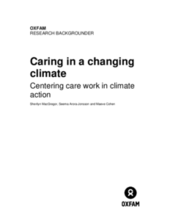The global care crisis is being exacerbated by the global climate emergency, with interlocking impacts that threaten lives and livelihoods in all parts of the world. These impacts are particularly severe in resource-based economies and make everyday life difficult for people living with scarce resources and low incomes in rural areas of the global South. Climate change intensifies the work involved in caring for people, animals, plants, and places. It reduces the availability and quality of public services in marginalized communities and directly compounds the unfair distribution of unpaid care work that sustains gender inequality.
Yet the intersections of climate change and care work have been overlooked in the development literature. A lack of research has led to gaps in climate policy and planning. Strategies for climate mitigation and adaptation have paid relatively little attention to how care work is affected by climate impacts, nor have they considered whether interventions improve or intensify the situation of carers. Instead, when designing “gender-sensitive” climate actions, the focus has been largely on women’s economic empowerment as opposed to alleviating or transforming existing distributions of care work.
The aim of this report is to fill a knowledge gap by examining the points of interaction between climate change impacts and the amount, distribution, and conditions of unpaid care work. We focus on care workers rather than those who are cared for, while stressing the relational nature of care and acknowledging that carers too require care.

